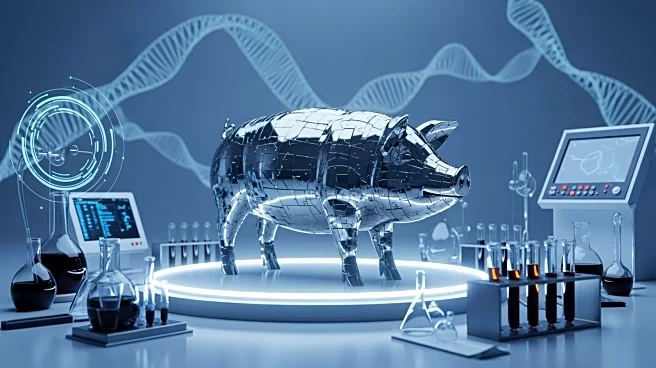What's Happening?
Researchers have successfully used CRISPR gene editing to create pigs that are completely resistant to classical swine fever, a highly contagious viral disease affecting livestock worldwide. This genetic
modification involves altering a single amino acid in a pig protein, which prevents the virus from replicating. The breakthrough was achieved by a team at the University of Edinburgh, and the pigs were tested in a secure facility where they showed no signs of infection when exposed to the virus. This development could significantly improve animal welfare and productivity, potentially reducing greenhouse gas emissions and lowering consumer prices. The gene-editing work was partly funded by Genus, a large international breeding company, which is considering commercializing these pigs.
Why It's Important?
The introduction of gene-edited pigs resistant to classical swine fever could have profound implications for the livestock industry. By eliminating the need for labor-intensive and costly vaccination programs, farmers could see increased productivity and reduced operational costs. This could lead to more sustainable livestock production and potentially lower prices for consumers. Additionally, the reduction in disease outbreaks would improve animal welfare and decrease the environmental impact of pig farming. The success of this genetic modification could also pave the way for similar advancements in cattle and sheep, further enhancing the efficiency and sustainability of the livestock sector.
What's Next?
Genus is currently evaluating the commercial potential of these gene-edited pigs and is awaiting regulatory approval in key markets such as Mexico, Canada, and Japan. If approved, the company plans to begin selling the pigs' genetic material to farmers. Meanwhile, researchers are exploring the possibility of applying similar genetic modifications to cattle and sheep to protect them from related viral diseases. Regulatory frameworks for gene-edited livestock are still being developed in many countries, and the outcome of these discussions will likely influence the adoption and commercialization of this technology.
Beyond the Headlines
The use of gene editing in livestock raises ethical and regulatory questions, particularly concerning animal welfare and the long-term impacts of genetic modifications. While gene editing is often regulated less strictly than traditional genetic engineering, ensuring that these modifications do not negatively affect animal welfare is crucial. The success of this technology could lead to a reevaluation of breeding practices and regulatory standards, potentially leveling the playing field between gene-edited and traditionally bred animals.








